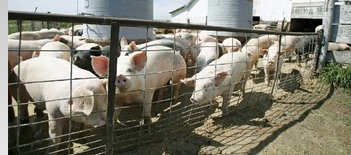By Dina Eliash Robinson
The good news is that we can always find one or more tasty substitutes for tainted foods we’re warned to avoid. The bad news is that food freakouts keep popping up like Freddy Kruger, way more frequently than an occasional Friday the 13th.
 This particular wave of bad news surfaced in 2004, when a new strain (named ST398) of MRSA (methicillin-resistant staphylococcus aureus) bacteria appeared on hog farms in the Netherlands and crossed from animals to humans who came in contact with them.
This particular wave of bad news surfaced in 2004, when a new strain (named ST398) of MRSA (methicillin-resistant staphylococcus aureus) bacteria appeared on hog farms in the Netherlands and crossed from animals to humans who came in contact with them.
Although this strain soon jumped international borders, infecting swine and some of their human handlers throughout Europe, Canada and the United States, it is only recently that the mainstream media has begun to pay serious attention to this growing threat. New York Times columnist Nicholas D. Kristof nailed the cause in his March column by wondering, “…whether we as a nation have moved to a model of agriculture that produces cheap bacon but risks the health of all of us.”
In his follow-up a few days later, Kristof pointed out that each year, more than 18,000 Americans die of MRSA infections, exceeding AIDS fatalities in the U.S. He blames agribusiness interests, which has, so far, been able to block legislation banning the reckless administration of antibiotics to food animals.
Why such vehement opposition to banning the practice? Money, of course. More of which can be made by crowding the maximum number of livestock into the smallest spaces—i.e., in ‘concentrated animal feedlot operations,’ or CAFO. Also known as ‘factory farms.’
Economics, global competition and above all, a monstrous lack of commonsense have created a system in which livestock is warehoused in overcrowded and unspeakably filthy conditions, and fed massive doses of antibiotics to keep alive and ‘healthy’ enough to slaughter and sell. On hog farms, antibiotics ‘protect’ prematurely weaned piglets, to allow sows quickly back into production… of more piglets. Chiching!
Message to the FDA and other government agencies assigned to protecting the safety and wholesomeness of our food supply (borrowed from the lyrics of the musical “1776”): “Is anybody there? Does anybody care?”
So, the practice continues, exposing people who eat meat products derived from conventionally grown beef, pork, chicken, turkey or other livestock, to antibiotic-resistant bacteria. The risk, in fact, has been growing for years, as the MRSA ‘superbugs’ or ‘flesh-eating bacteria,” have become the scourge of hospitals, nursing homes and other institutions, where vulnerable populations and their caregivers are exposed to infections.
If you’re among the health-conscious consumers who recently switched from beef to what has been misleadingly hyped by the swine industry as ‘the other white meat,’ feel free at this point to throw a hissy fit. Especially since you might also want to avoid chicken and turkey sausages imprudently stuffed into pork casings.
Being next on the food chain, some of us are not even aware (or prefer not to know) that with each morsel of meat—be it beef, pork, chicken or turkey not grown organically—we are not just medicating, but over-medicating ourselves with antibiotics—and often with growth-hormones as well.
Researchers have found that MRSA-ST398 transfers easily from swine to their handlers, who in turn, can infect people with whom they come in contact. (see www.Aetiology.com ) Since the bug is nearly impossible to kill, prevention must be the first line of defense. And until the FDA and others responsible for protecting the safety of our food supply get their act together, it’s up to each one of us to look out for ourselves. (www.plosone.org/article/info%3Adol%2Fjournal.pone.00042)
Faced with this recently discovered, deadlier strain of MRSA- ST398, will we make better choices when shopping for groceries in the future?
Addendum to the Story:
CREATOR OF “PORK, THE OTHER WHITE MEAT” DIES
With his slogans, “Pork, the other white meat” and “Got Milk?, ”Charles D. Peebler Jr., gave pork eaters and dairy lovers powerful arguments against those who tried to guide them to healthier diets.
A superbly talented advertising man and CEO of the Bozell, Jacobs, Kenyon & Eckhardt agency, Mr. Peebler passed away on April 18 at age 72, in his Indian Wells home, of a rare illness not known to be caused by food choices. May he continue to impress and amuse wherever his next journey takes him.
Please read his obituary in the New York Times.

